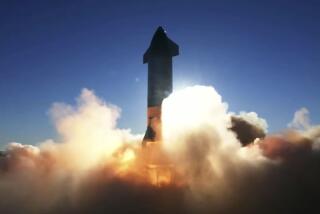International Cooperation Is the Route Into Manned Space
- Share via
In time, and with considerable expense, we can land men and women on Mars. We can also establish a permanent manned base on the moon. We are building a manned space station. And there are numerous fascinating unmanned missions we can undertake.
Because of the cost and time commitments involved in pursuing any of these options, we have important decisions to make about our nation’s future in space.
For those of us who played a role in formulating original U.S. space policy 32 years ago, considerations today about the future of space evoke strong feelings of deja vu . The situation now is vastly different from that of 1957 when Sputnik was launched, but the questions and the need to resolve them quickly are fundamentally the same. How big should our effort be? How should our programs be divided between military and civil? Manned and unmanned? National and international? And space exploration’s huge cost remains unchanged, causing tough choices for any nation contemplating significant space ventures.
Today, however, the one great difference lies in changed U.S.-Soviet relations. In 1958 and 1959, when the National Security Council Planning Board developed from scratch the first national policy on space, we were at the peak of the Cold War. The atmosphere between the two nations was hostile, distrustful and fearful. We welcomed each other’s failures and took great pleasure in “beating” the other in one space achievement or another.
Only on the most cosmetic level was there talk of cooperation. Barely beneath the surface was a shared fear that the other’s space capabilities portended important, perhaps, decisive, military capabilities. And in the struggle for world leadership, space achievements counted heavily as symbols of national advance or decline.
Today, such national security and world leadership concerns remain important to both nations, but count for much less. As our sophistication is increasing, our mutual paranoia is subsiding considerably. And the rest of the world is no longer so closely interested in “who’s ahead?”
Dr. Roald Sagdeyev, former director of the Soviet Space Research Institute and newly elected People’s Deputy, has made it clear that the United States is not alone in facing tough decisions about its future in space; such decisions also confront the Soviet Union.
So why not cooperate, where we can, under whatever ground rules we are comfortable with?
Cooperation can help alleviate the heavy financial pressure on both of our space programs. The United States, with its annual appropriations cycle and two-year congressional terms, has always felt downward pressure (sure to stay strong as long as the high deficit remains). The Soviet Union, more tightly controlled, has seemed better able to sustain long-term, high-cost programs. But now, with perestroika lagging, it, too, is feeling the pressure of public opinion on space expenditures. The Soviets are cutting back on existing programs, such as the Mir space station, and re-evaluating others, such as Mars exploration. They are also sensitive, Sagdeyev says, to the unnecessary costs incurred as a result of our respective programs duplicating one another.
So we both face the choice between cooperating or turning our backs on the major challenges in front of us.
In terms of current domestic attitudes toward cooperation on civil space exploration, both countries have much to draw on that we never had before. Whether or not we can overcome the obstacles to such cooperation is the question.
There is, for example, the widely held American view that cooperating with the Soviets on non-military space projects will afford them disproportionate gains from “technology transfer.” While this concern is valid, it is manageable because so many measures have been developed to protect against undesirable disclosures.
If we can overcome this and other roadblocks, we will have an enormous potential joint capability--scientifically, technologically and economically. If we cannot, or choose not to do so, we might as well forget about major advancement in space for a long time to come.
Yes, we will have a worthwhile menu of unmanned space missions such as the recently launched Magellan probe to Venus, the on-going Project Earth missions and the forthcoming Hubble telescope mission. But we will have forgone any meaningful manned exploration of the universe, and perhaps even have seriously limited our opportunities for unmanned missions. That would be sad given the measure of our joint capabilities. And it would be difficult, if not impossible, to resuscitate such capabilities once abandoned.
It is time we take a new giant leap in space and, with prudence at every step, go with it on an international basis. The exploration of space, to realize its full potential, must become an arena of international cooperation.
More to Read
Sign up for Essential California
The most important California stories and recommendations in your inbox every morning.
You may occasionally receive promotional content from the Los Angeles Times.













